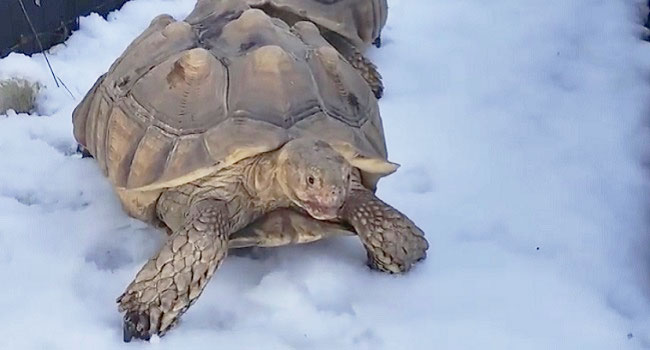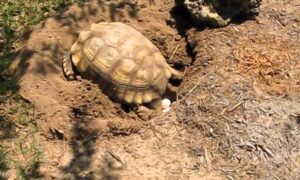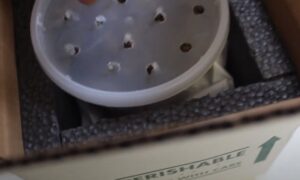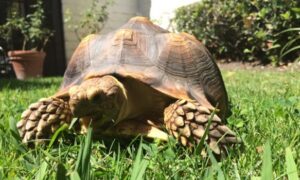Sulcata tortoises are large basking tortoises. They’re native to warmer climates, however in captivity, people all over the world have pet sulcatas. This puts sulcata tortoises in a variety of climates throughout the year, which means sulcatas can be exposed to colder temperatures than what they’re native to.
Since sulcatas do not hibernate, it’s important common health problems to sulcata during winter, in the cold. You’ll want to understand how to prevent these winter illnesses.
Respiratory Infection
Because tortoises are ectothermic, their body temperature is regulated by environmental conditions. Prolonged exposure to low temperatures can lead to respiratory infections. Sulcata tortoises are susceptible to respiratory infections when they are in cold, damp environments.
Signs of respiratory infection in sulcatas:
- Runny nose
- Puffy or swollen eyes
- Drainage or bubbles coming from the mouth, eyes or nose
- Difficulty breathing
- Open mouth breathing
- Whistling while breathing
- Lethargic and a decrease in energy
- Excessive sneezing, coughing or gasping
- Loss of appetite
In order to reduce the risk of respiratory infections in sulcata tortoises during winter, ensure there is a heat source where the tortoise is housed. Consider a sealed dog house with proper insulation and heating for larger tortoises. If the sulcata is small enough to bring into an indoor enclosure consider creating a safe indoor enclosure with proper heat and UV lighting.
Dehydration in Winter
Water is often overlooked during the winter months, but water is still very important for hydration. Dehydration can cause organ dysfunction, including kidney problems.
Signs of dehydration in sulcatas:
- Dry skin
- Sunken eyes
- Lethargy
Ensure fresh water is always provided to reduce the risk of dehydration in your tortoise. Continue regular soaks in warm water.
Vitamin Deficiency
Natural sunlight is essential for vitamin D3 synthesis, which is vital for calcium absorption. During the winter months, the days are shorter and your tortoise may bask less.
Consider adding supplements and/or a UV light source. Monitor for lethargy, changes in your tortoise’s shell and difficulty moving.
Not only is sunlight a potential concern, but availability of food. During winter, your sulcata’s normal food sources may be limited. You may need to add grocery store greens to your tortoise’s diet or a commercial tortoise pellet.





